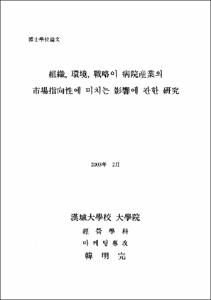組織, 環境, 戰略이 病院産業의 市場指向性에 미치는 影響에 관한 硏究
= (A) Study on the Effects of Organization, Environment, and Strategy on Market orientation of the Hospital Industry
- Files in This Item:
-
-
Download
 000000066237.pdf
기타 데이터 / 4.08 MB / Adobe PDF
000000066237.pdf
기타 데이터 / 4.08 MB / Adobe PDF
-
Items in Repository are protected by copyright, with all rights reserved, unless otherwise indicated.